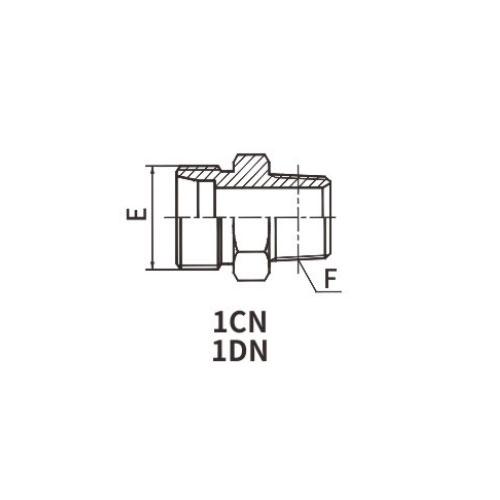Why Are Hydraulic Adapters Essential for Industrial Systems?
2025-01-07
In many industrial applications, hydraulic systems play a vital role in powering machinery and equipment. These systems rely on the efficient transmission of fluid power through various components, including pumps, valves, cylinders, and hoses. However, one often-overlooked component that ensures smooth operation is the hydraulic adapter. But why are hydraulic adapters so essential for industrial systems? In this blog, we’ll explore the role of hydraulic adapters, their types, and how they contribute to the functionality and safety of hydraulic systems.
What is a Hydraulic Adapter?
A hydraulic adapter is a crucial component that connects different parts of a hydraulic system, such as pipes, hoses, and fittings. It serves as a transition piece, enabling components with different thread types, sizes, or connection styles to fit together seamlessly. Essentially, hydraulic adapters provide the flexibility needed to ensure the system works smoothly, even when different parts come from various manufacturers or have different specifications.
Hydraulic adapters are made from high-quality materials such as steel, stainless steel, or brass, which are resistant to corrosion and wear. They are designed to withstand high-pressure environments, where the fluid being transferred in the system may be under significant force. These adapters are used in various industries, including manufacturing, agriculture, construction, and automotive, to ensure that hydraulic systems function effectively and safely.
Why Are Hydraulic Adapters Important?
1. Ensuring Compatibility Between Different Components:
Hydraulic systems often contain a mix of components from different manufacturers, each with varying connection types, thread patterns, and sizes. Without hydraulic adapters, it would be challenging to connect these different parts, leading to potential leaks, inefficiencies, or system failures. Hydraulic adapters provide a universal solution, allowing components of different sizes and specifications to be connected without compromising performance.
2. Preventing Leaks:
Hydraulic systems operate under high pressure, and even a small leak can result in fluid loss, reduced system efficiency, and potential hazards. Hydraulic adapters are designed to create a secure, leak-free connection between different parts of the system. By ensuring that all components are tightly sealed and securely joined, adapters help prevent the loss of hydraulic fluid and reduce the risk of accidents or equipment failure.
3. Improving System Flexibility:
One of the key advantages of hydraulic adapters is that they allow for greater flexibility in system design and maintenance. If a component needs to be replaced or upgraded, a hydraulic adapter can often allow you to connect the new part to existing infrastructure, even if they have different sizes or thread types. This adaptability makes it easier to maintain and upgrade hydraulic systems, minimizing downtime and lowering repair costs.
4. Facilitating Quick Repairs and Maintenance:
Hydraulic adapters play a significant role in facilitating the repair and maintenance of hydraulic systems. When servicing a system, it’s common to encounter components that are not an exact match. With the use of hydraulic adapters, maintenance teams can quickly adapt the system for replacement parts or modifications, ensuring that repairs are completed promptly and with minimal disruption to operations.
5. Ensuring Pressure Resistance:
Hydraulic systems typically operate at high pressures, and all components, including adapters, must be able to withstand this force. Hydraulic adapters are specifically designed to handle the high-pressure fluid flow within the system without compromising their structural integrity. This resistance to pressure ensures that the system remains operational under demanding conditions, providing reliable performance throughout its lifespan.
6. Durability and Longevity:
Hydraulic adapters are made from materials that are resistant to wear, corrosion, and other environmental factors. This durability ensures that the adapters perform optimally over time, even in harsh industrial environments. The longer lifespan of hydraulic adapters means less frequent replacements, reducing maintenance costs and increasing overall system reliability.
Types of Hydraulic Adapters
There are several types of hydraulic adapters, each designed for specific applications or connection needs. Here are some of the most common types:
1. Straight Adapters:
Straight hydraulic adapters are used to connect two components in a straight line, typically when connecting hoses or pipes with similar thread sizes or specifications. They are simple yet effective and are ideal for creating secure, straight connections between parts.
2. Elbow Adapters:
Elbow adapters are used when a 90-degree angle is required in the hydraulic system. These adapters allow hoses or pipes to change direction, making them useful in systems where space is limited or where the layout of the components requires a specific angle of connection.
3. Tee and Cross Adapters:
Tee and cross adapters are used to branch out fluid flow in multiple directions. These adapters enable the hydraulic fluid to flow to several parts of the system simultaneously, making them essential for systems that require multiple connections at a single point.
4. Reducing Adapters:
Reducing adapters are used to connect components of different sizes. These adapters allow a larger pipe or hose to be connected to a smaller one, helping to ensure compatibility between different system components.
5. Flange Adapters:
Flange adapters are used to connect pipes or hoses to flanged connections. These are commonly used in systems where high pressure is involved, as flanged connections offer a secure, leak-proof seal.
6. Threaded Adapters:
Threaded adapters are designed to connect components with different thread types or sizes. They are available in a variety of thread configurations, including NPT (National Pipe Thread), BSP (British Standard Pipe), and JIC (Joint Industry Council), among others. Threaded adapters provide a reliable, tight connection for different threaded components.
How to Choose the Right Hydraulic Adapter?
Choosing the right hydraulic adapter is crucial for ensuring the performance and safety of the system. Here are a few factors to consider when selecting a hydraulic adapter:
1. Thread Type and Size:
The most important consideration when choosing a hydraulic adapter is ensuring that it matches the thread type and size of the components being connected. If the threads do not match, the connection will not be secure and may lead to leaks.
2. Material:
The material of the hydraulic adapter should be compatible with the hydraulic fluid and environmental conditions of the application. For example, stainless steel adapters are ideal for systems that require corrosion resistance, while brass adapters are often used in lighter-duty applications.
3. Pressure Rating:
Hydraulic adapters must be able to withstand the pressure at which the hydraulic system operates. It’s essential to choose adapters that are rated for the appropriate pressure to avoid failure or damage to the system.
4. Application:
The application in which the adapter will be used can also influence the choice of adapter. For example, adapters used in high-pressure systems may need to have reinforced structures, while adapters in low-pressure systems can be simpler in design.
5. Size and Configuration:
Depending on the system's layout, you may need specific adapter sizes and configurations. Be sure to select the appropriate type of adapter (e.g., straight, elbow, reducing) based on the connection needs of the system.
Conclusion: The Unsung Hero of Hydraulic Systems
In conclusion, hydraulic adapters are essential components that provide flexibility, compatibility, and reliability in hydraulic systems. By allowing various components with different thread types, sizes, or connection styles to be linked together, hydraulic adapters ensure that the system operates smoothly and efficiently. Whether you’re building a new hydraulic system or maintaining an existing one, selecting the right adapters is key to preventing leaks, reducing downtime, and maximizing the lifespan of your equipment. By understanding the importance of hydraulic adapters, you can make more informed decisions to keep your hydraulic systems performing at their best.



